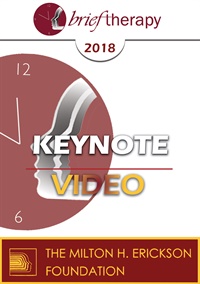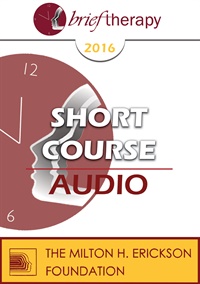
- Average Rating:
- Not yet rated
- Topic Areas:
- Short Courses | Brief Therapy | Community | Multicultural | Therapist Development
- Categories:
- Brief Therapy Conference | Brief Therapy Conference 2016
- Faculty:
- Karin Schlanger, MFT | Gloria Diaz Arnal, MFT Intern
- Duration:
- 1:11:09
- Format:
- Audio Only
- Original Program Date:
- Dec 08, 2016
- Short Description:
- Palo Alto Brief Therapy model applied in an educational context. Focus on advantages of using this approach when the context is a challenge in itself. The presenters – Ms. Schlanger is the heir to the MRI-Brief Therapy model, will bring examples illustrating a useful model when working with a diverse community.
- Price:
- $15.00 - Base Price
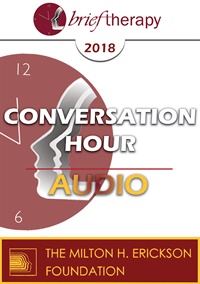
- Average Rating:
- Not yet rated
- Topic Areas:
- Great Conversations | Multicultural | Brief Therapy | Treatment Planning
- Categories:
- Brief Therapy Conference | Brief Therapy Conference 2018
- Faculty:
- Laura Brown, PhD | Elliott Connie, MA, LPC
- Duration:
- 1:05:53
- Format:
- Audio Only
- Original Program Date:
- Dec 08, 2018
- Short Description:
- Contemporary therapist need to understand culturally competent practice. Principles of assessment and treatment will be offered.
- Price:
- $15.00 - Base Price
Credit available - Click Here for more information
- Average Rating:
- Not yet rated
- Topic Areas:
- Keynotes | Meditation, Spirituality and Yoga | Multicultural | Psychotherapy | Religion | Brief Therapy
- Categories:
- Brief Therapy Conference | Brief Therapy Conference 2018 | Online Continuing Education
- Faculty:
- Patricia Arredondo, EdD
- Course Levels:
- Master Degree or Higher in Health-Related Field
- Duration:
- 1:03:49
- Format:
- Audio and Video
- Original Program Date:
- Dec 05, 2018
- Short Description:
- Latinx Immigrants in psychotherapy need to be seen from a strength versus deficit perspective. Across generational differences, there are cultural anchors from the family, spirituality and religion, interdependence, and self-determination that lead to achievements in the midst of adversity. The sociopolitical context and structural barriers to documented and undocumented immigrants need to be recognized as factors of oppression, trauma, and discrimination, yet, Latinx persons persevere for their families, and those they left behind. Because of the Latinx relational orientation, therapists can engage through respectful culture-centered, interpersonal approaches.
- Price:
-
Sale is $29.00
price reduced from Base Price - $59.00
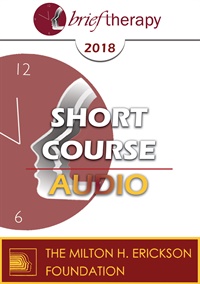
- Average Rating:
- Not yet rated
- Topic Areas:
- Short Courses | Communication | Multicultural | Sex and Sexuality | Brief Therapy
- Categories:
- Brief Therapy Conference | Brief Therapy Conference 2018
- Faculty:
- Mitra Rashidian, PhD
- Duration:
- 1:30:26
- Format:
- Audio Only
- Original Program Date:
- Dec 06, 2018
- Short Description:
- In this workshop, clinicians’ level of comfort, barriers, and attitudes when talking about sexuality will be highlighted, along with useful strategies to provide better engagement with their clients. Additional strategies used to build upon a person’s individual strengths to assist them in overcoming cultural and personal sexual imprints are offered.
- Price:
- $15.00 - Base Price
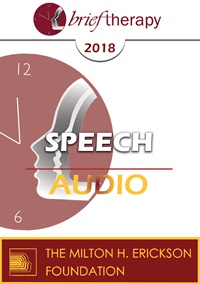
- Average Rating:
- Not yet rated
- Topic Areas:
- Speeches | Multicultural | Strategic Therapy | Brief Therapy | Strengths-Based
- Categories:
- Brief Therapy Conference | Brief Therapy Conference 2018
- Faculty:
- Terry Soo-Hoo, PhD
- Duration:
- 1:42:11
- Format:
- Audio Only
- Original Program Date:
- Dec 09, 2018
- Short Description:
- The Culturally Sensitive Strength-Based Strategic Therapy method was developed to integrate various principles founded by the Mental Research Institute (MRI) and Jay Haley’s Strategic Therapy approach as well as other methods to address these issues. In this workshop, guidelines will be presented for learning the principles of Culturally Sensitive Strength-Based Strategic Therapy. There will be an emphasis on effective strategies in working within the cultural context of the client and how this is critical to successful therapy. A structure will be presented for organizing the specific tasks and skills involved in different aspects of the method including activating the client’s strengths. Case examples, some on video recordings, will illustrate many innovative brief therapy techniques.
- Price:
- $15.00 - Base Price
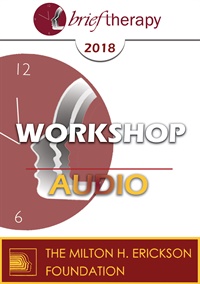
- Average Rating:
- Not yet rated
- Topic Areas:
- Workshops | Multicultural | Trauma | Brief Therapy | Mindfulness
- Categories:
- Brief Therapy Conference | Brief Therapy Conference 2018
- Faculty:
- Laura Brown, PhD
- Duration:
- 1:59:58
- Format:
- Audio Only
- Original Program Date:
- Dec 07, 2018
- Short Description:
- Just as human beings are not generic, so, too, trauma is an event that is affected by and interacts with people's intersectional identities. This workshop will introduce participants to a mindful model for understanding how to move towards cultural competence in practice with trauma survivors. We will pay particular attention to therapist countertransference/fragility, and to the effects of shame, guilt, privilege, and dominant culture narratives on trauma treatment. Some experience working with trauma survivors is assumed.
- Price:
- $15.00 - Base Price
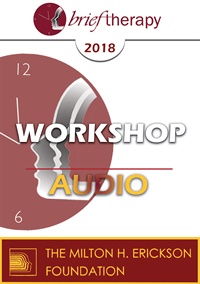
- Average Rating:
- Not yet rated
- Topic Areas:
- Workshops | Brief Therapy | LGBTQ | Multicultural | Trauma
- Categories:
- Brief Therapy Conference | Brief Therapy Conference 2018
- Faculty:
- Rick Miller, MSW
- Duration:
- 1:46:52
- Format:
- Audio Only
- Original Program Date:
- Dec 07, 2018
- Short Description:
- The relationship between gay sons and their mothers is fascinating based on the history of psychiatry pathologizing this bond, suggesting an enmeshment that contributed to the son being gay. Currently, this relationship consists of an empowering bond that contributes to a healthy sense of self in a world where acceptance isn’t necessarily prevalent. The actual key to wellbeing consists of receiving good enough mothering rather than total acceptance of his being gay. This presenter, a gay male author notes that there is little information on this topic, hence the inception Gay Sons and Mothers. This “docuseries” consists of photos and narratives depicting these bonds, video interviews portraying the emotional aspects of their relationships, as well as theory based on interviews and personal experiences.
- Price:
- $15.00 - Base Price
Tags: Gay LGBTQ Multi-Cultural Trauma
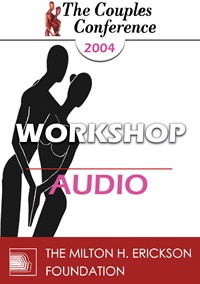
- Average Rating:
- Not yet rated
- Topic Areas:
- Workshops | Couples Therapy | Multicultural | Religion | Gender
- Categories:
- Couples Conference | Couples Conference 2004
- Faculty:
- Esther Perel, MA, LMFT
- Duration:
- 1:44:56
- Format:
- Audio Only
- Original Program Date:
- Mar 26, 2004
- Short Description:
- Cultural and religious differences provide the backdrop against which couples' issues of commitment, gender and child raising, as well as, family connectedness and cultural loyalty are played out. Mixed couples often face difficult decisions at key junctures in the life cycle. In this workshop, participants will learn to identify conflicts around culture and religion, tease out the cultural contexts of common couples' dilemmas, and help clients make informed choices about the role that group continuity, family tradition and cultural values will play in their lives.
- Price:
- $15.00 - Base Price
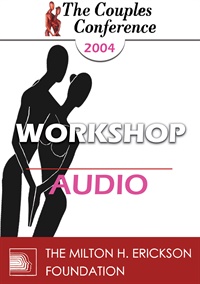
- Average Rating:
- Not yet rated
- Topic Areas:
- Workshops | Couples Therapy | Intimacy | Multicultural | Sex and Sexuality
- Categories:
- Couples Conference | Couples Conference 2004
- Faculty:
- Esther Perel, MA, LMFT
- Duration:
- 1:28:38
- Format:
- Audio Only
- Original Program Date:
- Mar 26, 2004
- Short Description:
- This workshop examines the cultural pressures that shape domesticated sex and the puzzling inverse correlation between greater emotional intimacy and the loss of sexual desire. It will demonstrate how to help couples draw pleasure from the hidden, the suggestive and the uncanny while also respecting their needs for safety and stability. Using case examples, we will explore how to grant the body its profound capacities for communicating in its own language.
- Price:
- $15.00 - Base Price
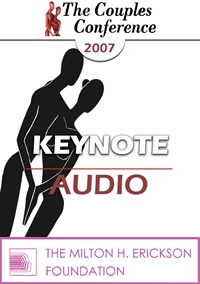
- Average Rating:
- Not yet rated
- Topic Areas:
- Keynotes | Abuse | Couples Therapy | Multicultural | Community | Gender
- Categories:
- Couples Conference | Couples Conference 2007
- Faculty:
- Cloe Madanes, HDL, LIC
- Duration:
- 59:31
- Format:
- Audio Only
- Original Program Date:
- Apr 27, 2007
- Short Description:
- This presentation will cover the assessment and detection of spousal and partner abuse, as well as intervention strategies. Community resources, cultural factors and same gender abuse dynamics also will be discussed.
- Price:
- $15.00 - Base Price
Please wait ...


